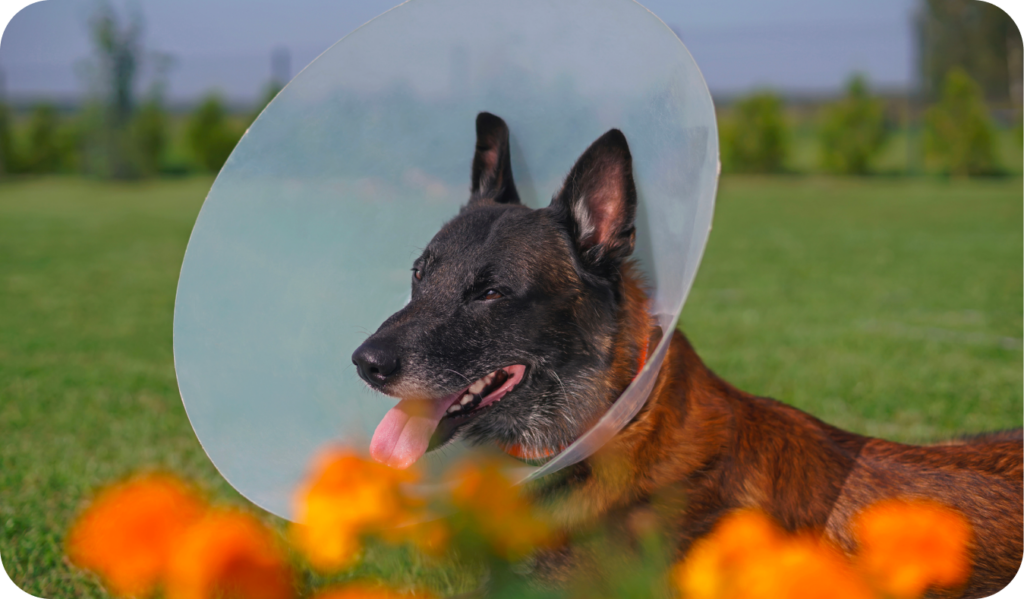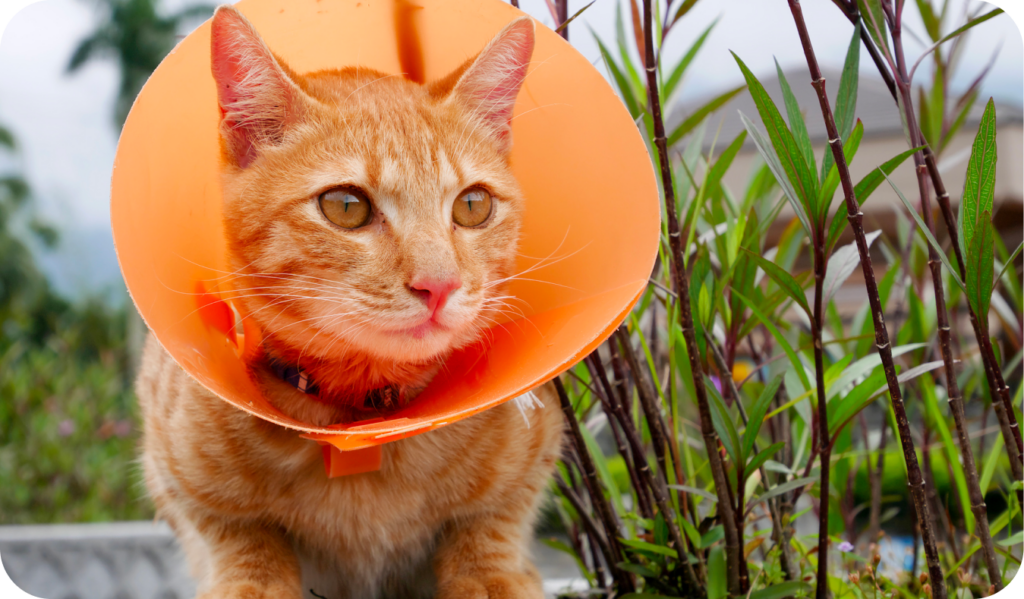Healthcare
Desexing
Unless you are 100% certain you intend to allow your dog or cat to breed, we recommend having your puppy/kitten desexed once it is 4-6 months old. Desexing has lots of health and behaviour benefits for both males and females.

- They will not develop uterine infections (pyometra)
- They will not spot blood like when they were in season
- They are significantly less likely to develop mammary tumours later in life.
Research states if your puppy is spayed before her first season (typically 6-12 months of age) then there is 98% reduction in risk of mammary tumour development (you are almost guaranteed she will not develop mammary tumours!). Each season your dog has increases the risk by about 20%.
The cost of de-sexing a female dog weighing 20kg-30kg is $481.85. Other weight ranges are available – please contact us to get a more accurate price estimate for your dog. De-sexing includes:
- A pre-anaesthetic blood test, to check liver and kidney function is normal prior to giving any sedation or anaesthetic drugs.
- Hospitalisation
- Surgery – including intra-dermal sutures, which are self-dissolving suture that isn’t visible on the outside, and is less irritating.
- IV fluids throughout their surgical procedure (to help maintain their blood pressure)
- 2 post-operative nurse examinations
- Pain relief in hospital and to go home with for 3 days after surgery
- An Elizabethan collar (cone of shame) if needed to stop them from getting to their surgical wound.
- Additional surcharges will apply if your dog is older than 18 months of age, is pregnant or in season. Please contact our friendly team for more advice if you think this may apply to you.
- They are less likely to be aggressive towards other dogs (not guaranteed, as there are a number of behaviours that can lead to aggression)
- They are much less likely to develop prostate disease later in life.
Prostate disease can cause significant difficulty urinating, and can be a source of painful infection.
- They are less likely to try to escape your yard
- They will not be motivated to seek out in-season female dogs
An entire (uncastrated) male dog can smell an in-season bitch up to 2km away!!
The cost of de-sexing a male dog weighing 20kg-30kg is $433.05. Other weight ranges are available – please contact us to get a more accurate price estimate for your dog. De-sexing includes:
- A pre-anaesthetic blood test, to check liver and kidney function is normal prior to giving any sedation or anaesthetic drugs.
- Hospitalisation
- Surgery – including intra-dermal sutures, which are self-dissolving suture that isn’t visible on the outside, and is less irritating.
- IV fluids throughout their surgical procedure (to help maintain their blood pressure)
- 2 post-operative nurse examinations
- Pain relief in hospital and to go home with for 3 days after surgery
- An Elizabethan collar (cone of shame) if needed to stop them from getting to their surgical wound.
- Additional surcharges will apply if you are wanting a Scrotal Ablation. This involves removing the whole scrotal sac, and is purely a cosmetic procedure. If you would like further information on this, please contact our friendly team for more advice!

- They will not display in-heat behaviours such as restlessness and excessive vocalisation.
- We strongly recommend that your kitten is desexed if they are going to spend any time outdoors. Cats roam freely much further than dogs, and unwanted pregnancies are much more likely to occur.
- Cats can produce multiple litters in a year, with most litters being larger than 4 kittens.
The cost of de-sexing a female cat is $365.95. De-sexing includes:
- A pre-anaesthetic blood test, to check liver and kidney function is normal prior to giving any sedation or anaesthetic drugs.
- Hospitalisation
- Surgery – including intra-dermal sutures, which are self-dissolving suture that isn’t visible on the outside, and is less irritating.
- IV fluids throughout their surgical procedure (to help maintain their blood pressure)
- 2 post-operative nurse examinations
- A pain relief injection that will last for 3 days.
- An Elizabethan collar (cone of shame) if needed to stop them from getting to their surgical wound.
- They are less likely to urine spray in their territory
- They may not get into as many fights in the neighbourhood
- They cannot contribute to the large population of feral/stray cats in our environment
The cost of de-sexing a male cat is $252.50. De-sexing includes:
- A pre-anaesthetic blood test, to check liver and kidney function is normal prior to giving any sedation or anaesthetic drugs.
- Hospitalisation
- Surgery
- 1 post-operative nurse examination if required
- A pain relief injection that will last for 3 days.
- An Elizabethan collar (cone of shame) if needed to stop them from getting to their surgical wound.
Your pet will retain their pre-operation personality, possibly with the added bonus of being calmer and less aggressive.
No - it is actually better for her not to have any litters before being spayed. Her risk of developing breast cancer increases if she is allowed to go through her first heat.
Your pet's metabolism may be slowed due to hormonal changes after desexing, however this is easily managed with adjusting feeding and ensuring adequate exercise. There is no reason a desexed pet cannot be maintained at a normal weight.
As with all surgery, there is some tenderness immediately after the procedure, but most pets will recover very quickly. We administer pain relief prior to surgery and after surgery too. Your pet will be discharged with a short course of pain relief medication to take at home for the first few days after the surgery. In many cases, your pet will likely need some encouragement to take it easy!
No, your dog will be just as protective of their territory as before the surgery.
Before surgery:
- Make a booking for your pets operation.
- If your pet is a dog, you can wash them the day before surgery as they are then unable to be washed for 10 days after their surgery.
- You can give you pet an evening meal as normal the day prior to surgery, but do not leave food out overnight. Water should be freely available to your pet.
- A blood test may be performed prior to surgery to check vital organ function.
- The vet will perform a thorough physical examination before administering an anaesthetic.
- Intravenous fluid therapy is required during most types of surgery. This will be discussed with you prior to the procedure.
- To ensure your pet is as comfortable as possible, all pets receive pain relief as part of the desexing procedure, and we may prescribe medication for you to administer at home for a few days after the procedure.
After Surgery:
- Keep your pet restrained and quiet as the effects of anaesthetic can take some time to wear off completely.
- Keeping them quiet is also essential to allow the wound to heal. Their activity levels will need to be restricted for 10 days after the operation.
- Food should be limited to small portions only on the night of surgery. Follow any dietary instructions that the vet has provided.
- Ensure all post-surgical medications (if any) are administered as per the label instructions.
- Ensure your pet’s rest area is clean to avoid infection.
- Check the surgical wound at least twice daily for any signs of infection or disruption (e.g. bleeding, swelling, redness or discharge). Contact the vet immediately if any of these occur. Do not wait to see if they will spontaneously resolve.
- Prevent your pet from licking or chewing the wound. Special cone-shaped collars assist with this problem. A single chew can remove the careful stitching with disastrous effects.
- Ensure you return to us on time for routine post-operative check-ups.


